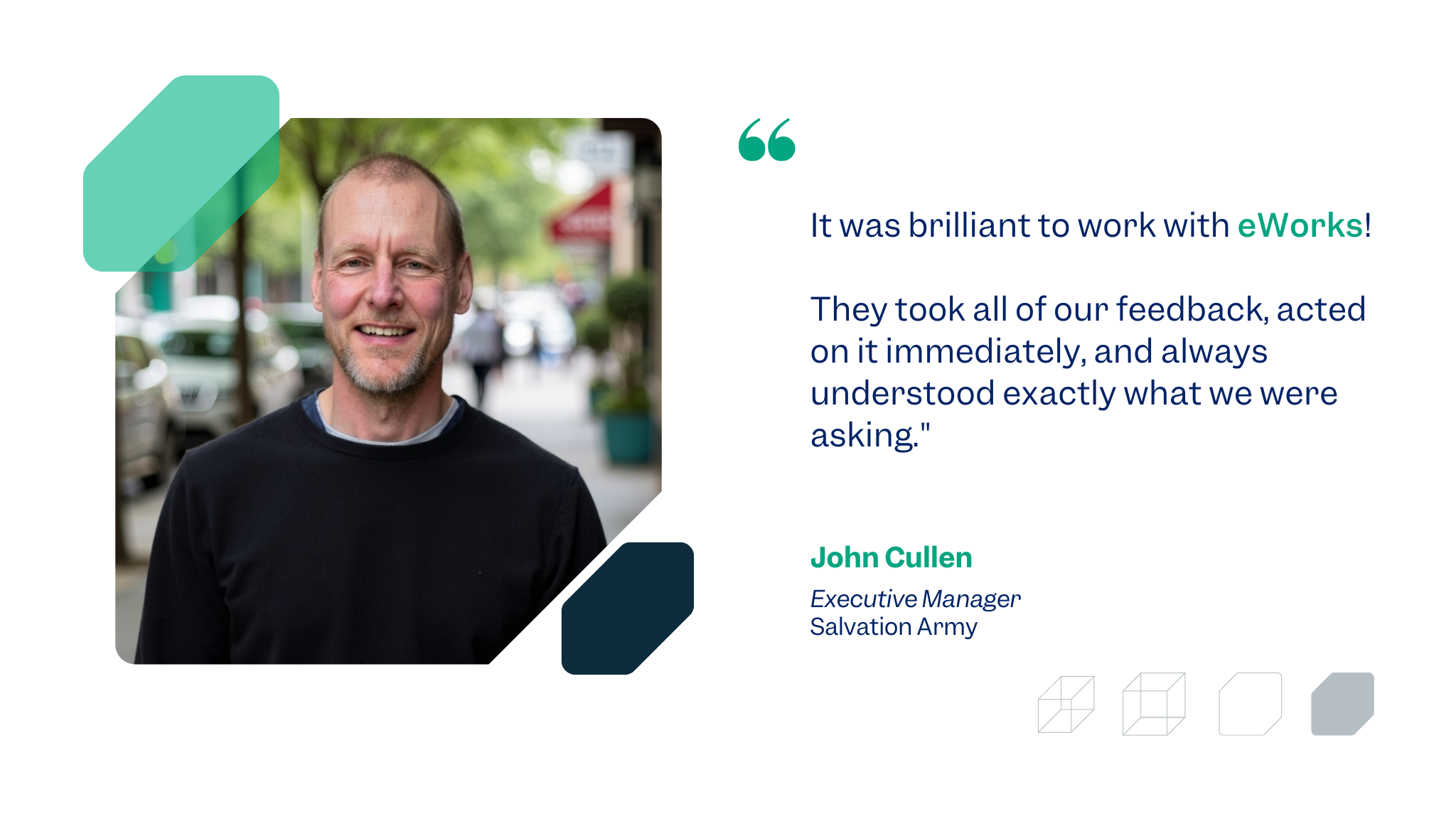Micro-credentials fill skills gaps and encourage future learning
The Salvation Army engaged eWorks to design and develop a comprehensive learning ecosystem aimed at equipping emerging program leaders, supervisors and managers in community services with the knowledge and skills essential for effective leadership.
It is common for people with expert knowledge in their profession to reach managerial level and be confronted by their own skills gaps. As they step up into a leadership role, they find they require administrative and people management skills on top of the expertise that got them to a senior position.
The Challenge
When the Salvation Army began considering how it could support staff who had trained as social workers and had moved into team leader and management roles, it identified a need for additional training that had to be tailored for busy team leaders and managers.
This resulted in the national faith-based charitable organisation working with eWorks to create 18 micro-learning modules.
John Cullen, Salvation Army Executive Manager Operations, with responsibilities across Community Engagement and Social Mission, says the modules enable staff to undertake targeted micro-learning without having to enrol in a degree or diploma course. Most already have a degree.
“People can focus on where they need to upskill,” he said. “They don’t have to spend a lot of time on it, these are short, sharp online modules they can do when it suits them – and they are very practical.”
The units have been designed as micro-learning, but can also be bundled towards a managerial qualification for staff who want to undertake further study.
The Solution
The Salvation Army engaged eWorks to design and develop a comprehensive learning ecosystem aimed at equipping emerging program leaders, supervisors and managers in community services with the knowledge and skills essential for effective leadership.
eWorks delivered a tailored solution for The Salvation Army that included:
- Collaborating with the client to identify the essential skills and knowledge required by emerging leaders in community services and integrating these into a cohesive skills and capability framework.
- Mapping these identified competencies into the BSB50420 Diploma of Leadership and Management, offering learners a pathway to accredited recognition for their achievements
- Developing 18 stand-alone micro-learning online modules, designed in Articulate Rise, featuring meaningful interactions and activities to reinforce key learning outcomes. These modules were seamlessly integrated into a comprehensive learning ecosystem.
- Setting up the micro-learning modules within eWorks’ LMS to ensure a smooth and engaging learner experience.
Understanding the unique dynamics of the community services sector, eWorks employed a tailored approach to the learning design for this project.
Why was bespoke learning design the solution?
There is plenty of “off the peg” leadership training available, but the Salvation Army wanted a bespoke offering targeted to users’ needs, and that would be engaging.
eWorks' subject matter expert studied the language of learning appropriate for the workforce to ensure it was directed at professional staff who were highly qualified and experienced.
David Eldridge, Project Advisor to the Salvation Army’s Social Mission Department, says the organisation does have a range of online learning for all staff but for its managers was looking for content that would spark their interest and not be seen as ‘box ticking’.
“It had to hit the mark for people to consider it, that was a key element,” he said. “Online delivery can be incredibly boring and sometimes is not for everybody. We believed you do need a professional agency to sharpen the training content.”
He sees the project as not only supporting and training the organisation’s people but complementing its strategy to retain staff.
Getting started: How to identify skills gaps
Mr Cullen and Mr Eldridge held workshops with senior and middle managers to identify skills gaps and find out what learning would be needed, resulting in the topics for the 18 units.
The micro-credentials cover administration, partnerships, transformation, leadership, handling difficult staff, from peer to manager, and managing peers.
Partnerships are particularly important for the organisation and the training covers both how to build partnerships, and how to maintain them – subjects that Mr Eldridge says are rarely taught.
Staff can do one credential or all 18. Every unit comes with a digital badge that can be added to their c.v. or LinkedIn profile, and completed units can be bundled into groups of three or four to give them a unit towards a Diploma of Management with TAFE.
Why seek outside help with training with eWorks?
John Cullen says once the topics for the modules were identified, eWorks staff were able to quickly build a skill set that would guide towards a diploma.
“It is no good saying to our staff in social mission that they can do a Diploma of Community Work, they already have a degree in social work. To provide units to layer on to a Diploma of Management prepares them for their current role and their future.”
The organisation plans to integrate the units into operational processes, so it goes into goals when performance evaluations are conducted.
Staff reaction to micro-credential learning
The project was funded by the Australian Government Department and piloted in Victoria this year, but the project has proven its value and next year the Salvation Army will offer it to staff nationally.
Mr Cullen was surprised how quickly staff took up the learning offer, with some completing all 18 units within the first few weeks.
“It was something new, that they hadn’t seen before and that met their needs.”
Some have worked on units from their personal computers, in their own time, and the link has been shared so Mr Cullen has seen people who are not on staff complete units.
“It is a pilot program and we decided we would not say ‘no’ to anybody who wanted to do it,” said Mr Eldridge.
“We will distribute it more widely next year when it goes national.”
Working with eWorks on eLearning
Mr Cullen says it was “brilliant” to work with eWorks. “They took any of our feedback, acted on it immediately and always seemed to get the point of what we were asking.”
Mr Eldridge adds that the designers were also open to the particular characteristics of the Salvation Army’s operations, with its diversity of programs and people.
While the managers could identify the organisation’s training gaps, eWorks identified the training to fill them and how it could be delivered as micro-credentials and connected to the TAFE training system for staff who want to pursue further study.
“Training should be seamless but in practice it doesn’t work that way,” said Mr Eldridge. “Working with eWorks we found a way we could do this. They were committed to making it the best it could be and that’s like gold to us. We want to use our workforce in the best possible way, with the best partners.”
“We didn’t have the skills to do that. If the processes are cumbersome, people won’t log on. This portal is really simple and clear.”

Looking to create impactful, customised training for your team?
Discover how eWorks can help design tailored eLearning solutions that drive real results.
